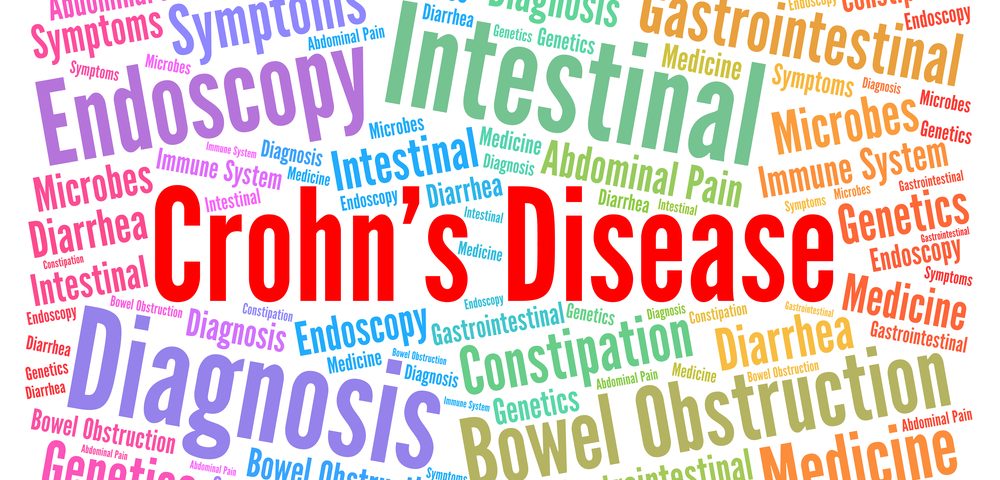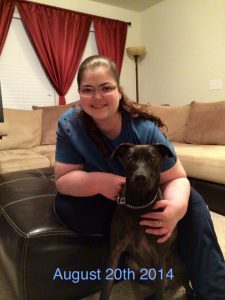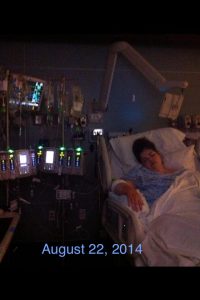My Crohn’s story started in August 2014. I woke up one morning with severe stomach pain and went to the emergency room. The doctors there ran some tests and came up with the conclusion my pain was likely caused by a small ovarian cyst. I informed them the cyst had been there since I was a teenager and had never caused me any problems. The doctor just said to follow up with my primary care doctor and gave me discharge papers.
As I was leaving the emergency room, I suddenly started throwing up. I could feel that whatever was going on was serious and I decided to check myself back into the ER. Unfortunately the same doctor walked in my room. He agreed the cyst wouldn’t cause me to start throwing up and went to look at a couple other tests results. When the doctor returned to my room, he informed me the scans also indicated there was some mild inflammation in my intestines. That could indicate the start of an infection and prescribed me an antibiotic. I left the ER with a feeling of helplessness, and as if the doctor had blown me off.
Things go from bad to worse
A few hours after I went home, my husband found me unresponsive and called 911. When I arrived at the hospital, I had renal failure, sepsis and was in shock. Over the next 36 hours I was in critical condition. I remained unresponsive with a high fever, dangerously high heart rates and dangerously low blood pressures.
The critical care doctors were working hard to save my life. Only being able to go off of the symptoms that brought me to the ER to start with, they called a gastroenterologist to help investigate what was happening. The gastroenterologist decided to perform a colonoscopy in order to get a better idea what was going on. He found that my colon had severely dilated and ultimately shut down, allowing a massive infection spread throughout the intestines.
What is interesting was there also was evidence of ischemic colitis, indicating a loss the blood flow to part of my intestines. It was becoming clear that my colon was posing the most danger to my life. A surgeon stepped in and explained to my family how, if I didn’t start responding to the medications soon, he would need to remove my entire colon in order to save my life.
Two steps forward, one step back
Thankfully, I started to respond to the medications and was slowly waking up. However, a new problem occurred. I started to feel as if something heavy was crushing my chest, making it hard to breathe. Tests confirmed I was in heart failure due to sepsis putting too much stress on my heart.
The doctors figured out I was suffering from toxic megacolon. As time passed, the medications continued working and I was slowly getting better, with both my kidneys and my heart also starting to function normally. All that remained were lingering stomach problems.
Three weeks after first being admitted to the hospital, I was finally able to go home. So much in my life changed after getting so sick. My days seemed to revolve around everything GI-related. I had daily stomach pain, nausea, severe bathroom issues, no appetite and no energy. My doctors weren’t sure why my symptoms persisted only saying to “give it time,” that my body needed to heal, and hoping everything would settle down soon.
Finally finding answers
By the time November came around I continued having trouble with my stomach. My gastroenterologist decided to do another colonoscopy and take some biopsies. The results came back confirming I have Crohn’s Disease. In August when I came down with toxic megacolon, it wasn’t clear as to why I developed it to start with. Now my doctors believe it was because my Crohn’s had developed so suddenly.
Sometimes getting a proper diagnosis of Crohn’s disease can be a challenge. This is because many of the symptoms associated with Crohn’s disease also are related to several other conditions. We know our own bodies better than anyone, so when doctors won’t listen to your concerns it’s important to find ones who will listen and investigate to find the root of what’s wrong.
Words doctors always should live by…
While in med school, doctors are taught a helpful phrase to use when diagnosing patients: “Don’t only focus on the horse, remember to look for the zebras, too”. This means not to assume symptoms point to common conditions (the “horse”). Sometimes they can point to complex or rare conditions (the “zebra”). It’s important to work with a doctor who considers all factors and will look for zebras.
***
Note: IBD News Today is strictly a news and information website about the disease. It does not provide medical advice, diagnosis, or treatment. This content is not intended to be a substitute for professional medical advice, diagnosis, or treatment. Always seek the advice of your physician or other qualified health provider with any questions you may have regarding a medical condition. Never disregard professional medical advice or delay in seeking it because of something you have read on this website. The opinions expressed in this column are not those of IBD News Today, or its parent company, BioNews Services, and are intended to spark discussion about issues pertaining to inflammatory bowel disease.



